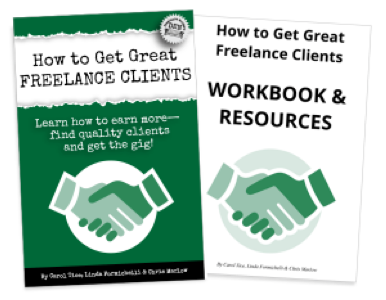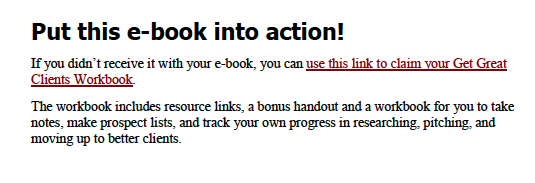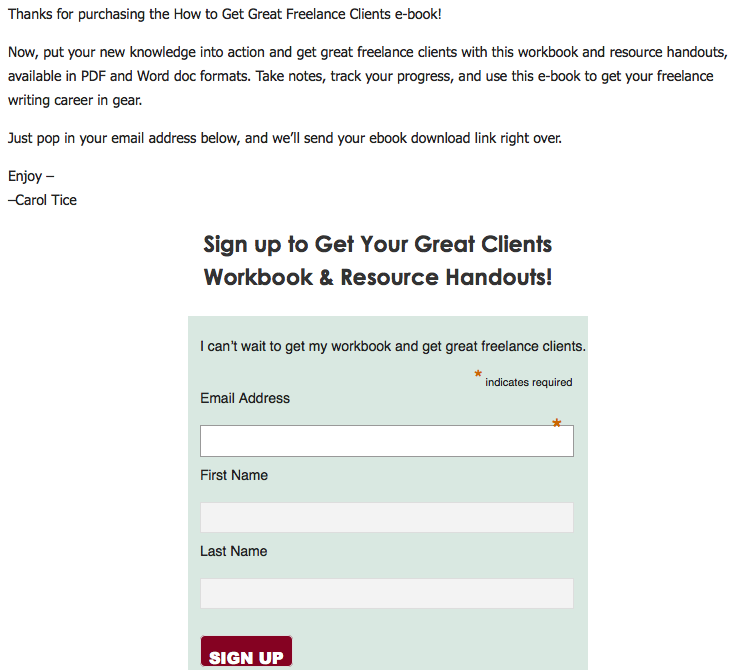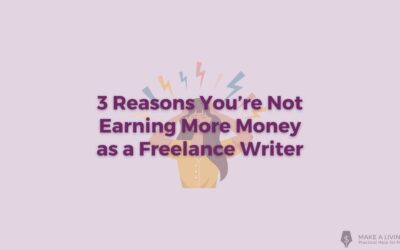
You’ve got a Kindle e-book for sale. The Kindle-only route is probably the most common one taken by new e-book writers. It seems so simple, yes?
Next, you hope Amazon’s magical algorithm wizards will send you a stampeding horde of buyers.
Often, that doesn’t happen. But say you do have a list of people you alert that your e-book is up — or maybe you catch a break with Amazon’s search results, and you make some sales. Sweet!
Soon, you’re looking to sell another e-book. That’s when you realize you’ve made a terrible mistake.
Where authors go wrong
When you sell on Amazon, there’s one big problem: You have no idea who bought your e-book.
You cannot email them and thank them for buying. You cannot build a relationship with them.
Most importantly, you cannot tell them when your next e-book is ready, so they can buy it, too!
Amazon buyers are a mystery — except to Amazon. They know exactly who they are, but won’t tell you. Such are the ways of Amazon.
It’s a major hindrance to your marketing future e-books, which is a key success strategy for self-publishers — selling additional e-books to previous buyers.
Fortunately, there is a way to get the names of your Amazon buyers. And it’s fairly simple to do.
How to capture Amazon buyers’ emails
To figure out who bought your Amazon e-books, you need a lure. You place it at the end of your e-book to compel purchasers to come visit your own website and give up their email address.
With fiction, that lure might be a character’s diary, bonus chapter, or alternative ending.
In nonfiction, it could be a template, bonus handout, or a workbook.
But whatever it is, on the last page of your e-book, you need a lure to bring that reader to your site where you can get their email and start building a closer relationship with them.
With my series of e-books derived from Freelance Writers Den bootcamps, I’ve gone with offering a workbook as my lure.
I’ve learned that nonfiction e-book readers want a good place to take notes, create lists, note action items, and brainstorm ideas. My workbook makes this easy.
How does it work? For example, the offer on the last page of my e-book How to Get Great Freelance Clients looks like this:
That link brings readers to a page here on the blog, with that same workbook graphic, and this:
And there you have it — an Amazon e-book buyer has given me their email, in order to claim their workbook.
Now I can let them know when my next e-book is coming out! And possibly sell it to them direct on my own site, where I keep 100 percent of the revenue.
Even if you’re only selling on Amazon, this gives you the ability to alert your Kindle-buying fans when you have a new release, instead of your only hope being that Amazon will decide to send your buyers a marketing email that includes your offering.
Without getting the emails yourself, you are trusting your future sales to Amazon. It’s your only marketing tool.
I don’t believe anybody is going to market my e-books with the passion I have for it, especially Amazon. And you can’t build close relationships with readers you can’t talk to.
With readers’ emails in your pocket, you can give out incentives, discounts, bonuses, free consulting, or other early-reader rewards. This gets your fans motivated to buy your next release.
The final step to make more sales
There’s one more step to maximizing your e-book sales from Amazon buyers.
If they’ve come over and put in their email, you’ve sent the buyer a goodie. That’s another piece of content you can use to tempt your buyer to make another purchase — and make it directly from you, if you’re selling off your own site, too.
You can put another offer or product ad on the end of your goodie, such as a discount coupon for the next e-book purchase. Around here, we sometimes put links to check out Freelance Writers Den, or a link back to my main e-book page, where they can see all my e-books.
If you’re writing e-books, knowing who’s reading them is key to earning more from those e-books. I say, get the emails.
How do you lure readers to give you their emails? Leave a comment and share your tactic.














